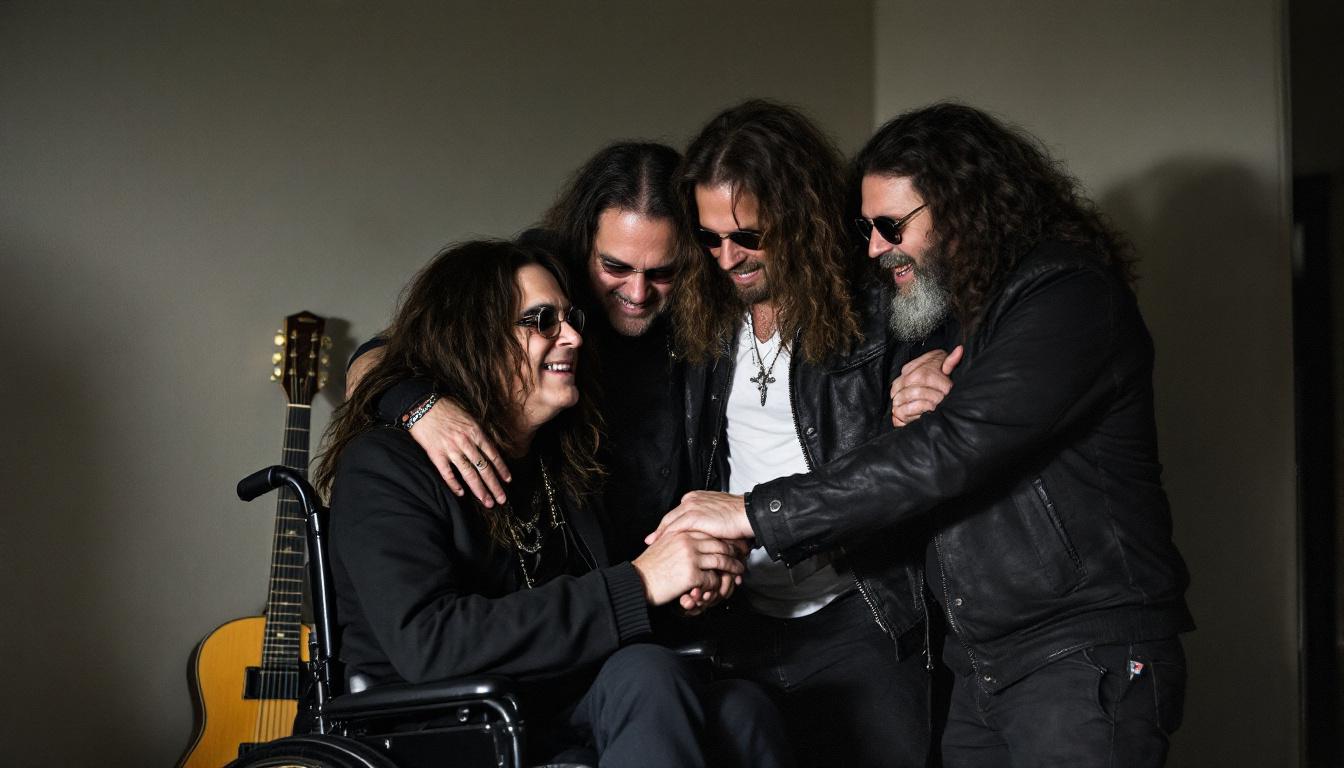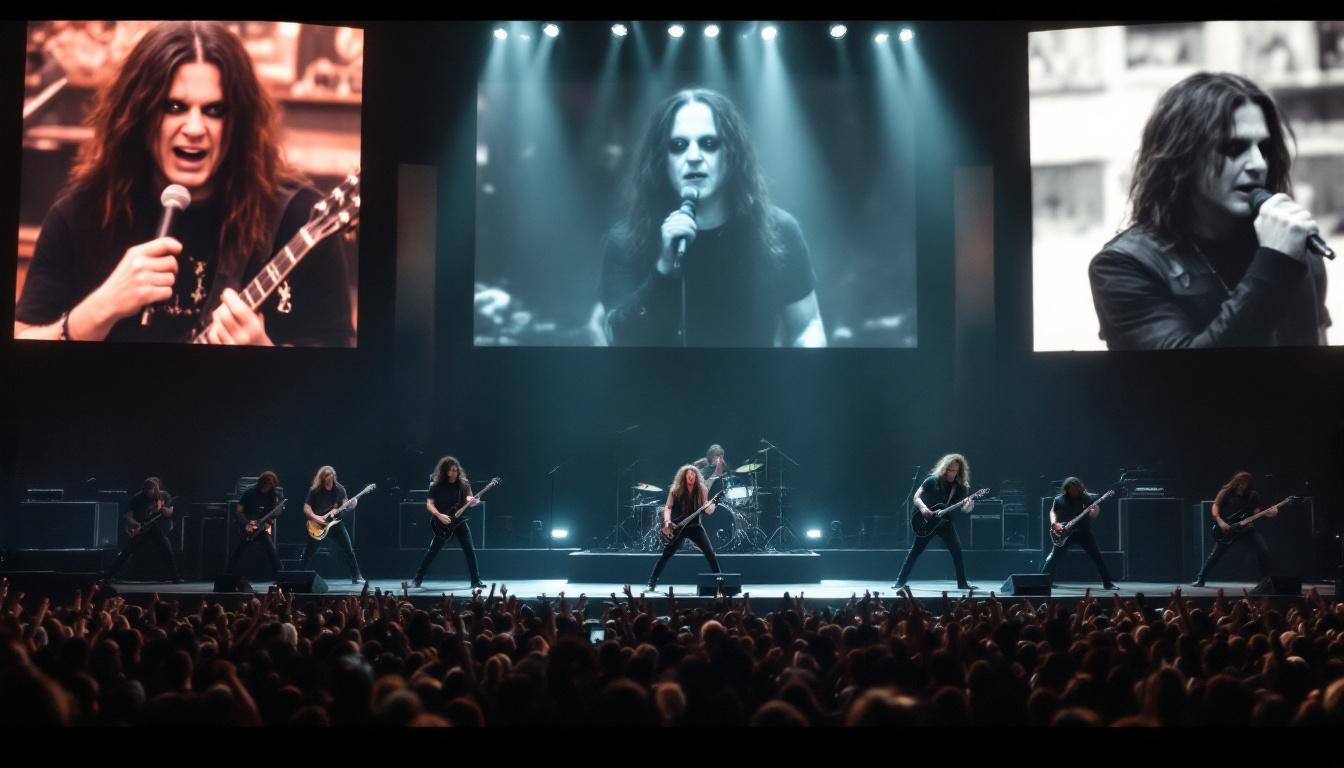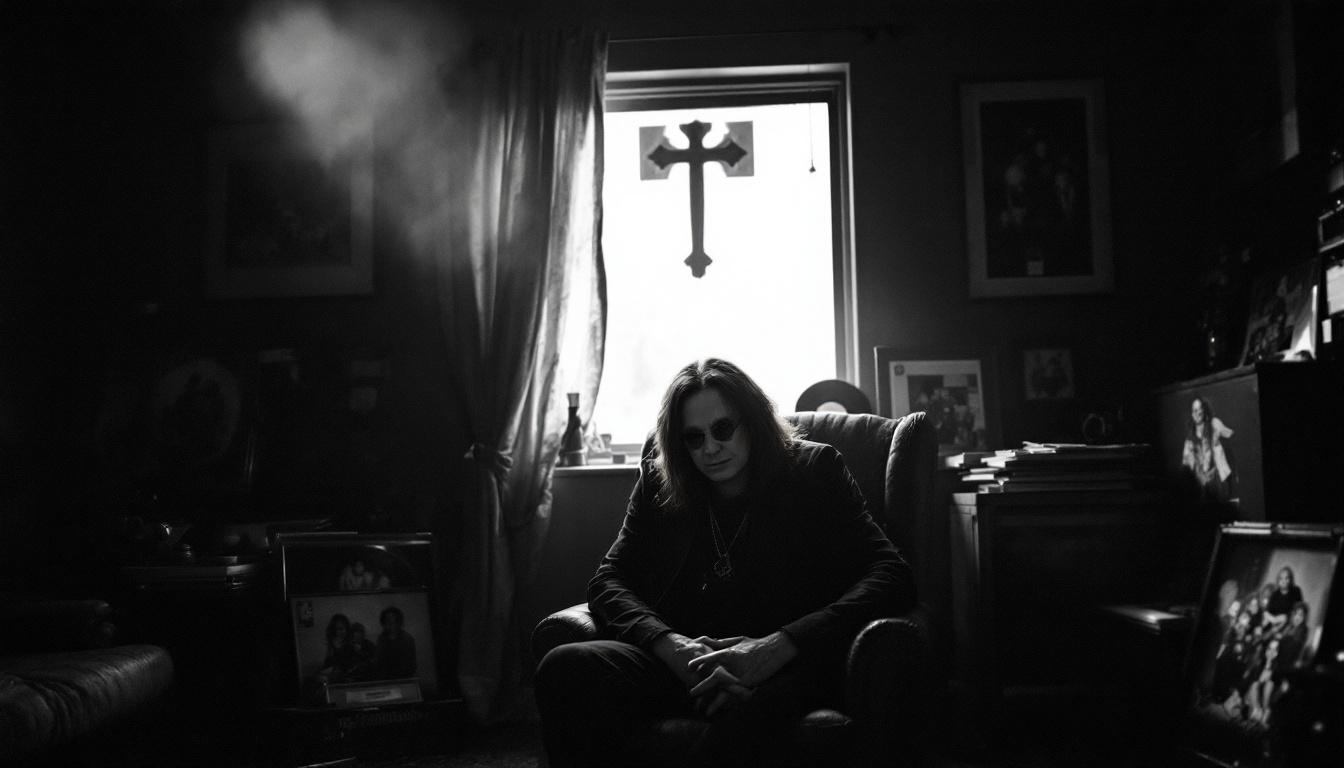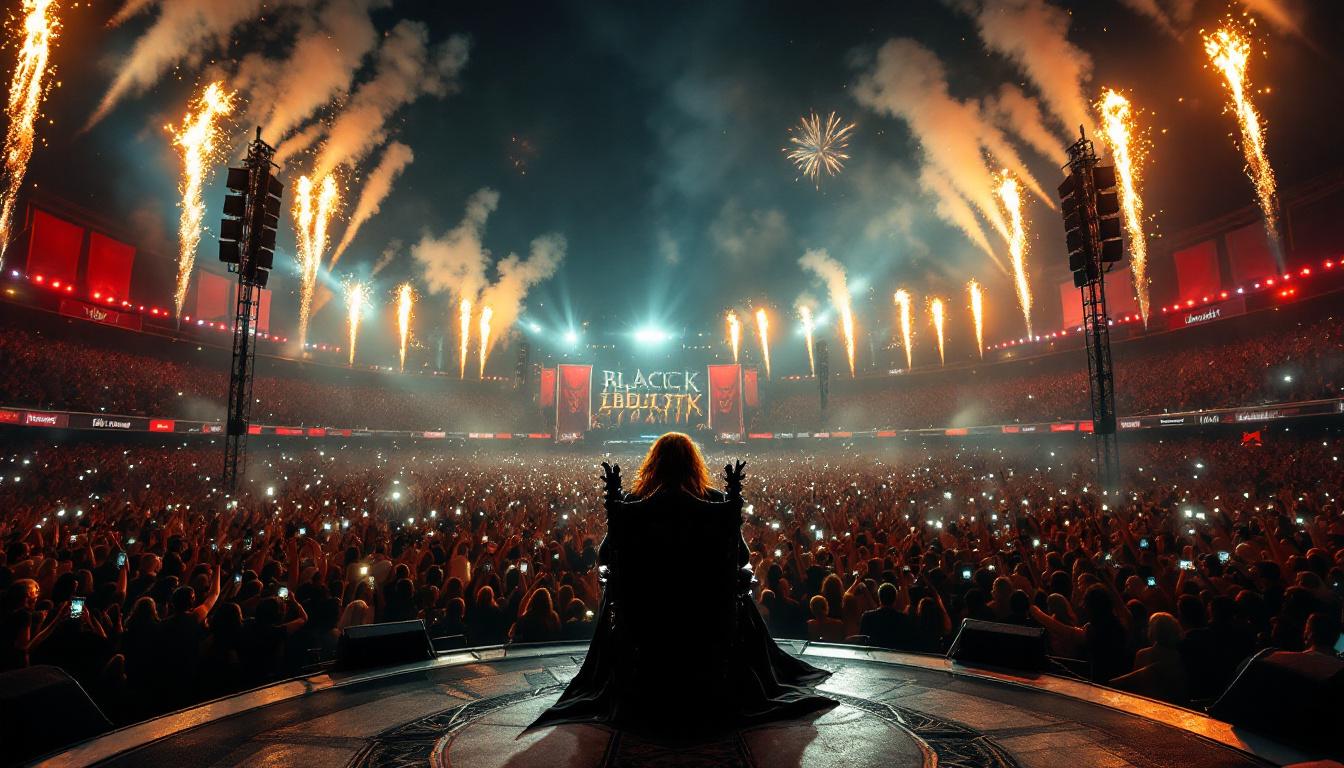Introduction: One Last Song for Metal Royalty
In July 2025, a sold-out Villa Park stadium in Birmingham became the center of the music world as Ozzy Osbourne, flanked by the original members of Black Sabbath, gave his final live performance. The show wasn’t just another concert—it was a heart-stopping, bittersweet goodbye from the band that shaped heavy metal. As fireworks rained down and more than 42,000 in the crowd sang along, the legacy of Ozzy and Sabbath was carved even deeper into rock history.
A Farewell Built on Brotherhood and History
Ozzy’s journey, from the rough streets of Birmingham to the world stage, was always tied to his bandmates—Tony Iommi, Geezer Butler, and Bill Ward. Together, Black Sabbath invented a sound that changed music forever: loud, dark, thrilling, and honest. Behind the scenes before the show, those decades of friendship and struggle—addiction, recovery, and everything in between—were clear.

For Ozzy, plagued in recent years by Parkinson’s and spinal surgeries, the decision to end live performances couldn’t have been easy. But the reunion backstage proved that brotherhood in music is stronger than health or age. Quiet laughter, tears, and supportive hugs set the tone for the night. These men weren’t just bandmates—they were family.
The Final Performance: Celebration, Nostalgia, and Power
As Ozzy took the spotlight, sitting on a gothic throne—part practicality, part theatricality—fans cheered a man who had given his voice and energy to music for over half a century. Sabbath’s setlist was a trip through time:
- “War Pigs” exploded with power and rage, protest alive even after all these years.
- “N.I.B.” reminded everyone of the blues roots deep in Sabbath’s core, while the bass thundered across the stadium.
- “Iron Man” thundered with the stomp of metal, Ozzy conducting the crowd in call-and-response.
- “Paranoid” closed the reunion set, a burst of raw energy that made time feel suspended.
Ozzy’s physical challenges were impossible to ignore—his energy was reserved, his movements sparing—but his voice cut through, rich with experience and gratitude. When he called out, “Thank you from the bottom of my heart,” it wasn’t just for show. It was the speech of a man who knew this was the end of something precious.
A Starry Night of Tributes and Rock Royalty

The event wasn’t just about Sabbath. Metallica, Guns N’ Roses, Slayer, Alice in Chains, and a parade of superstars turned the night into a full-scale tribute. Tom Morello curated the guest lineup—artists who grew up on Sabbath’s riffs. Their covers of Sabbath classics felt like fans returning the favor: Metallica’s take on “Sabbath Bloody Sabbath” was massive, while Steven Tyler and Billy Corgan lent their voices to “Children of the Grave.”
Giant screens flashed vintage photos—a young Ozzy in sequins, early band practice sessions, the wild days of ’70s debauchery. The arena echoed with the sound of a hundred thousand stories: the kids who picked up guitars after hearing “Paranoid,” the bands who found metal’s soul in Sabbath’s groove.
Beyond the Stage: The Heart and the Healing
Ozzy chose to give back, too. Proceeds went to Cure Parkinson’s, Birmingham Children’s Hospital, and Acorns Children’s Hospice, showing another side to the “Prince of Darkness.” Fans—many in black leather and vintage Sabbath shirts—understood: Metal may trade in darkness and energy, but its heart is communal. Sabbath, and Ozzy, built their legacy on loyalty.
Sabbath’s Place in History
Black Sabbath’s influence is everywhere. Formed in 1968, their gloomy riffs and unpredictable rhythms led bands like Metallica, Iron Maiden, and Soundgarden. Critics used to turn up their noses—now, Sabbath sits in the Rock & Roll Hall of Fame and on countless “most important albums” lists. Their impact crossed generations, genres, and continents.
Consider the numbers:
- Millions of albums sold worldwide.
- Concerts played in every major city on earth.
- Grammy Lifetime Achievement, Ivor Novello Award, and endless honors.
But maybe more important than awards is the feeling. Sabbath’s music gave power to the outsider, the misfit, the rebel. Ozzy, often dismissed for his wild image, was in truth a survivor—a symbol of hope for people who didn’t fit the mold.
Health, Age, and the Meaning of Goodbye
The 2025 farewell was shaped by honesty. In the past five years, Ozzy had been open about his struggles: his Parkinson’s announcement in 2020, the surgery that followed, and the slow retreat from public life. Ending his stage career on his own terms, with his chosen family and hometown, was as much a statement as any lyrics he ever screamed.
The visual was unmistakable—Ozzy, older and a little fragile, but defiant as ever beneath the crown of heavy metal.
A Quiet Legacy: Music, Family, and Memory

Not long after the final show, a video message went out—Ozzy at home, surrounded by family photos, a beloved cross around his neck, shelves overflowing with vinyl and awards. This quieter Ozzy, once so publicly wild, now cherishes reflection. He thanked his wife Sharon, kids, friends, and—most of all—the fans who supported his wild ride.
He spoke about legacy not as something won, but as something shared. “Every riff, every show, was for you. Heavy metal isn’t about one man—it’s about the family we made together. I love you all, always.”
The Meaning of the End
So, what does it really mean when Ozzy Osbourne and Black Sabbath take their final bow?
It’s not just the curtain falling on a band. It’s the closing of a chapter in modern music—a chapter full of rebellion, honesty, humor, and resilience.
Ozzy’s last concert wasn’t just a spectacle, although it certainly felt like one. It was a message: music matters, no matter how weird or heavy or wild. It reminded us that to be an outsider is okay; to be honest and brave is enough.
Sabbath’s Lasting Influence: What Comes Next?
The ripples of Sabbath’s sound will echo for decades. Young bands will still be inspired by their records. Fans will still be comforted by those familiar riffs when the world feels rough.
And Ozzy? He’ll likely find ways to stay in the culture, whether through interviews, a memoir, or more behind-the-scenes projects. He leaves the stage, but not the conversation.
Farewell, But Not Forgotten
As the crowd filed out of Villa Park, firework smoke still in the air, fans knew they’d witnessed something rare: not just a good night out, but a living piece of musical history.
Maybe that’s why Black Sabbath’s music lingers. It stands for something stubborn and human—creativity that refuses to die, no matter what battles life throws your way. Ozzy and his band gave us the gift of permission: to find your tribe, to play your song, and never apologize for the noise in your soul.
Maybe, just maybe, that’s why the chants of “Ozzy! Ozzy!” rang out long after the final note.
With gratitude and a little sadness, the world says goodbye to Ozzy Osbourne, the original Prince of Darkness, and Black Sabbath, the band that started it all. The noise will fade, but the impact will last forever.
To contact us click Here.


Some truly interesting information, well written and broadly speaking user genial.
This is the right blog for anyone who wants to find out about this topic. You realize so much its almost hard to argue with you (not that I actually would want…HaHa). You definitely put a new spin on a topic thats been written about for years. Great stuff, just great!
Precisely what I was searching for, appreciate it for posting.
Great post. I was checking constantly this blog and I am impressed! Extremely useful information specifically the last part 🙂 I care for such information much. I was looking for this particular info for a long time. Thank you and good luck.
Thanks for sharing excellent informations. Your web site is very cool. I am impressed by the details that you’ve on this web site. It reveals how nicely you understand this subject. Bookmarked this web page, will come back for more articles. You, my friend, ROCK! I found simply the information I already searched all over the place and just could not come across. What a perfect web site.
I¦ll immediately grab your rss as I can’t in finding your email subscription hyperlink or e-newsletter service. Do you have any? Kindly allow me realize in order that I may just subscribe. Thanks.
**mitolyn**
Mitolyn is a carefully developed, plant-based formula created to help support metabolic efficiency and encourage healthy, lasting weight management.
**aquasculpt**
aquasculpt is a premium metabolism-support supplement thoughtfully developed to help promote efficient fat utilization and steadier daily energy.
**prodentim official website**
ProDentim is a distinctive oral-care formula that pairs targeted probiotics with plant-based ingredients to encourage strong teeth, comfortable gums, and reliably fresh breath
**mounja boost official**
MounjaBoost is a next-generation, plant-based supplement created to support metabolic activity, encourage natural fat utilization, and elevate daily energywithout extreme dieting or exhausting workout routines.
**men balance**
MEN Balance Pro is a high-quality dietary supplement developed with research-informed support to help men maintain healthy prostate function.
**herpafend**
Herpafend is a natural wellness formula developed for individuals experiencing symptoms related to the herpes simplex virus. It is designed to help reduce the intensity and frequency of flare-ups while supporting the bodys immune defenses.
**prostafense official**
ProstAfense is a premium, doctor-crafted supplement formulated to maintain optimal prostate function, enhance urinary performance, and support overall male wellness.
**boostaro official**
Boostaro is a purpose-built wellness formula created for men who want to strengthen vitality, confidence, and everyday performance.
**neuro sharp**
Neuro Sharp is an advanced cognitive support formula designed to help you stay mentally sharp, focused, and confident throughout your day.
**back biome official**
Mitolyn is a carefully developed, plant-based formula created to help support metabolic efficiency and encourage healthy, lasting weight management.